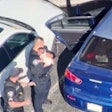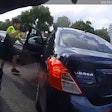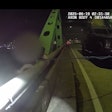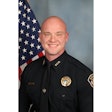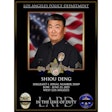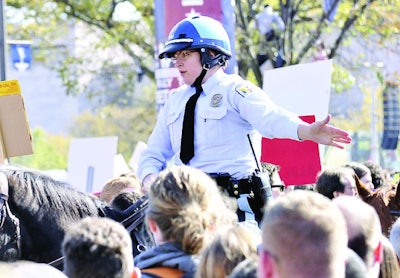 Photo: iStockPhoto.com
Photo: iStockPhoto.com
Providing security for special events—whether they be quick parades or large-scale celebrations—can task a law enforcement agency for days. Surrounding yourself with people who can provide invaluable support in the preparation and execution of any security plan will help ensure your success.
Avoid myopia when preparing, so you don't leave out people outside of the organization whose assistance and insight will make the event run smoothly.
After you assess the impact of the event on your organization, coordinate with the people or groups that will help you implement your security plan. You'll want to involve the event coordinator; fire and EMS; information technology; public works; the media; and organized volunteers.
1. The Event Coordinator
Events have individuals or groups responsible for preparing and ensuring that things go as planned. They determine when, where, and how such an event will unfold. Be warned that these laymen have expectations about the support provided by your law enforcement agency. These might not square with your own ideas.
It's your job to work with the coordinator to develop a sound initial concept. For example, a parade route shouldn't go down Main Street at the height of rush-hour traffic.With the right preparation, you could pull this off. The more elaborate the parade route, the greater the number of impacted intersections.
The main goal of profit-oriented groups is making money, so they'll want to plan an event that's the most elaborate in your town's history. A commander must curtail these plans beforehand. If an elaborate idea moves forward, be prepared to handle a response if things get out of control. One harebrained idea involved an event planner who wanted to land a helicopter in the middle of a venue. Fortunately, with the help of fire inspectors and zoning gurus, this disaster didn't happen.
The coordinator can be your ally. By working with the coordinator on the front end of an event, you establish a network that lets you know when things don't go as planned. This can prove invaluable when moving resources around and responding during the event. The one call letting you know about an unscheduled dignitary or a delay in the schedule can work to your benefit when handling crowd and traffic control.
2. Fire and EMS
These public safety partners face similar challenges when providing services during a special event. Working with them can help you deal with slow response times, confusion about what's needed where, and access to timely information.
One of my most successful experiments was establishing a joint command center with law enforcement, fire, and EMS. Communicating directly about a call, what the officers have found, and the best route to the scene eliminates confusion caused by a remote dispatch center. These professionals have a clearer understanding about what to expect, what information is needed by responders, and how to quickly get responders on their way without numerous descriptions and requests to dispatch.[PAGEBREAK]
3. Information Technology (IT)
How many events have been planned, vetted, and begun when officers discover they can't talk with one another on the radios? Who makes sure everyone has the "determined" channel, and how do officers navigate to the channel? We've all been called out "go to B10" only to learn that the other officer doesn't have "B10." The IT personnel should know the regional communications configurations.
The incident commander may have established a Command Post (CP) for public safety or event coordination for a large event. Smaller events won't require a CP, but when you set one up, you'll need to know what information will be made available? Are there public or private cameras available? Municipal internet filters can play havoc, when commanders try to view public streaming video. Simple coordination on the front end and having that person available during the event makes changes on the fly a breeze.
4. Public Works
The Public Works staff can be the unsung heroes of any event, because we're often oblivious to details such as trash, traffic or pedestrian congestion. These "little things" can help an event run smoothly or give it the appearance of chaos.
A large number of visitors arriving in your community for an event presents challenges for the Public Works department. Extra scheduled trash pick-ups and trash-bag placement help control litter at the event or along a parade route. Coordination for additional clean-up and that person responsible for deploying those resources can be key.
Additional barricades or stops signs can help keep pedestrians corralled or divert traffic around a specified area. Most municipalities now have computerized traffic signals and grids controlled from a central hub. Adding a few seconds to a traffic light can keep traffic moving along smoothly on primary routes during a parade.
5. The Media
Events present a wealth of information to be shared across the broadest forums possible. Who better to help you disseminate updates than members of the media?
This has become even more crucial with the advent of social media that keeps everyone connected almost instantaneously. They can help inform neighborhoods and businesses about how an event will affect their plans or operation prior to the event to make sure things go as smoothly as possible. Parade routes, parking restrictions, site location, restrictions on packages and other pre-event information needs to be circulated to minimize confusion.
Media professionals want to be in the know, and are willing to use their resources to keep their public informed. During the event, you can use these same media connections to quickly notify the public of changes or a new problem.
6. Organized Volunteers
An organized volunteer cadre is a resource that pays consistent dividends to any police department. During a special event, volunteers can help with public notifications by handing out fliers, making calls, bagging meters, running errands, and providing support for food services or logistics. Volunteers must be trained and vetted before you deploy them as an agency representative. They are one of the most loyal sources of manpower.
Gerry Long served with the Savannah-Chatham (Ga.) Metropolitan Police Department for more than 30 years, retiring in 2011 as a deputy chief.
Related:












